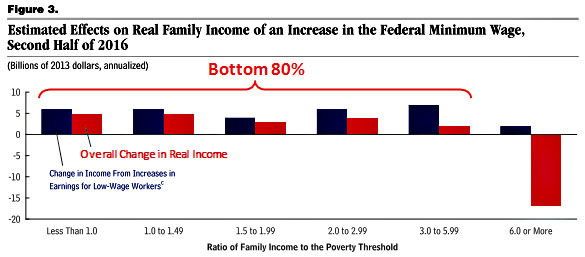The CBO released a study today on the effect of raising the minimum wage to $10.10. The chart below shows their main finding: millions of families outside the upper middle class would see a net increase in income (partly from higher wages and partly from higher economic growth) while families in the top 20 percent would see a decline (primarily from having to pay slightly higher prices for goods and services):

The cost of this higher income is fewer jobs: CBO estimates that employment would fall by about 0.3 percent, or 500,000 workers. That strikes me as being on the high side of consensus estimates, but it’s probably in the right ballpark.
As economic policies go, that’s not bad. In the real world, there’s no such thing as a policy that has benefits with zero costs. There are always compromises. In this case, in return for the small job losses, 16 million workers would get a direct wage increase; another 8 million would get an indirect wage increase; and nearly a million workers would be lifted out of poverty. That’s about as good as it gets.
All that said, this is a report that I suspect CBO shouldn’t have bothered doing. Their value-add lies in assessing the effects of legislation that no one else is studying. But the minimum wage has been studied to death. CBO really has nothing to add here except its own judgment about how to average out the dozens of estimates in published academic papers. In other words, they aren’t adding anything important to the conversation at all. This report is going to get a lot of attention, but it really doesn’t teach us anything new.
UPDATE: This post originally said that 80 percent of all families would benefit from a minimum wage increase. But the CBO figures don’t actually say that. Families throughout the bottom 80 percent of the income spectrum would benefit, and each individual income bucket that CBO studied would see a net increase in income, but that doesn’t mean every single family would benefit. I’ve corrected the text to reflect this.













